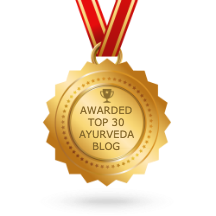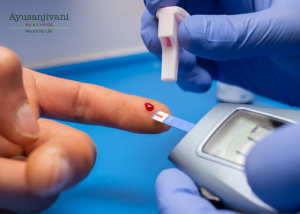Table of Contents
ToggleSymptoms of Low AMH : Understanding the Signs of Declining Ovarian Reserve
Introduction :
Fertility is closely linked to ovarian health, and one of the most widely discussed markers today is AMH (Anti-Müllerian Hormone). Women who face difficulties in conceiving often come across the term Low AMH. While AMH itself does not directly produce symptoms, it reflects the quantity of eggs remaining in the ovaries—also known as ovarian reserve.
In this blog, let’s explore the symptoms of low AMH, how they impact fertility, and what women should watch out for.

What is AMH?
Anti-Müllerian Hormone is produced by small follicles in the ovaries. Measuring AMH levels gives an estimate of ovarian reserve, helping fertility specialists understand a woman’s reproductive potential.
- Normal AMH levels indicate a healthy egg reserve.
- Low AMH levels suggest diminished ovarian reserve, meaning the ovaries have fewer eggs left
Ayurvedic Causes of Low AMH :
In Ayurveda, the concept of fertility is deeply connected to the balance of Doshas (Vata, Pitta, Kapha), the health of Dhatus (tissues), and the purity of Shukra Dhatu (reproductive tissue). Low AMH, which indicates a reduced ovarian reserve, can be understood in Ayurveda as a weakness or depletion in the reproductive tissue formation process.
1. Beejotpatti Dushti (Defect in Egg Formation)
- AMH reflects the egg reserve in a woman’s ovaries.
- When there is defect or weakness in beej (ovum) due to imbalance in Doshas, the natural production of healthy follicles is disturbed.
- This leads to fewer and weaker eggs, corresponding to low AMH in modern terms.
2. Vata Dosha Imbalance
- Vata governs all movements in the body, including ovulation and menstrual cycles.
- Excessive Vata (caused by stress, irregular lifestyle, late-night work, excessive travel, or poor diet) can dry up the reproductive tissues and cause premature ovarian aging.
- Symptoms like irregular cycles, scanty flow, and early menopause often point to aggravated Vata.
3. Pitta Dosha Imbalance :
- Pitta represents heat and metabolism.
- When aggravated, it can cause excessive heat in the reproductive system, leading to faster depletion of eggs and hormonal imbalance.
- Women may experience hot flashes, irritability, and shortened menstrual cycles—signs of early ovarian decline.
4. Kapha Dosha Imbalance :
- Kapha provides nourishment and stability to tissues.
- When Kapha is low or impaired, proper nutrition to Shukra Dhatu (reproductive tissue) is compromised.
- Conversely, excess Kapha (as in obesity or PCOD) can block follicle maturation and disturb egg quality, indirectly affecting AMH.
5. Agnimandya (Weak Digestive Fire) :
- According to Ayurveda, all tissues are nourished through proper digestion and metabolism.
- If Agni (digestive fire) is weak, the nutrition from food does not reach deeper tissues like Shukra Dhatu.
- Over time, this leads to poor ovarian reserve and low AMH levels.
6. Rasa and Shukra Dhatu Kshaya (Depletion of Vital Tissues) :
- Ovarian reserve depends on the strength of Rasa Dhatu (plasma/nourishment) and Shukra Dhatu (reproductive tissue).
- Chronic stress, malnutrition, long-standing illness, or excessive medications can cause gradual depletion of these dhatus, leading to poor egg quality and reduced AMH.
7. Manasika Karana (Psychological Factors)
- Ayurveda emphasizes that mind and body are closely linked.
- Emotional stress, anxiety about conceiving, depression, or long-standing grief can disturb hormonal balance and accelerate ovarian decline.
8. Aharaja & Viharaja Nidana (Dietary & Lifestyle Factors) :
- Excessive intake of spicy, junk, processed, or preserved food.
- Overconsumption of alcohol, smoking, or chemical-laden diet.
- Sedentary lifestyle, lack of exercise, irregular sleep, or overexertion.
- These habits disturb the Doshas, weaken Agni, and reduce nourishment to reproductive tissues, resulting in low AMH
Symptoms of Low AMH :
Low AMH usually does not cause direct physical symptoms. However, its effects on the body and fertility often manifest in subtle ways. Here are the common signs associated with low ovarian reserve:
1. Difficulty in Conceiving
- One of the most common indicators of low AMH is trouble getting pregnant naturally.
- Women may try for months or years without success.
2. Irregular Menstrual Cycles
- Cycles may become shorter, longer, or unpredictable.
- Sometimes, periods may stop earlier than expected, signaling early ovarian decline.
3. Poor Response to Fertility Treatments
- Women undergoing IVF or other fertility treatments may notice fewer eggs retrieved during stimulation.
- The ovaries respond weakly to hormonal medicines, indicating low ovarian reserve.
4. Signs of Hormonal Imbalance
- Low AMH is often accompanied by fluctuating hormone levels.
- Possible symptoms include:
- Hot flashes
- Night sweats
- Vaginal dryness
- Low libido
- Mood swings
5. Early Onset of Menopause
- Some women with very low AMH may experience early menopause (before 40 years).
- Symptoms can include missed periods, irritability, and reduced fertility well before the expected age.
6. Family History of Infertility
- If close relatives (mother/sisters) experienced early menopause or infertility, it may be linked to genetically low AMH levels.
When to Seek Medical Help?
If you notice the above symptoms—especially irregular cycles, difficulty in conceiving, or poor response to fertility treatments—consult a gynecologist or fertility expert. Early testing and holistic care can help manage the condition better.
FAQs on Low AMH Symptoms :
Q1: Can I feel any direct physical symptom of low AMH?
👉 No. Low AMH itself does not produce direct symptoms, but its impact shows through fertility challenges and menstrual changes.
Q2: Does low AMH mean I cannot get pregnant?
👉 Not always. Many women with low AMH conceive naturally or with assisted reproductive techniques (IVF, IUI, donor eggs).
Q3: Can lifestyle affect AMH levels?
👉 Yes. Stress, smoking, poor diet, and certain medical conditions can accelerate ovarian decline.
Q4: Is irregular period always a sign of low AMH?
👉 Not necessarily. Irregular cycles may also occur due to PCOS, thyroid imbalance, or stress. Testing is essential for confirmation.
Takeaway :
While low AMH does not show obvious physical symptoms, women may experience signs such as difficulty conceiving, irregular periods, poor response to fertility treatment, hormonal imbalance, or early menopause. Recognizing these indicators early and seeking professional guidance is crucial.
If you are experiencing such issues, consult a fertility expert or an Ayurvedic doctor specializing in reproductive health for natural, holistic support.
Take appointment today only





